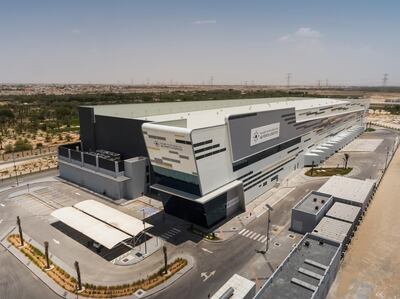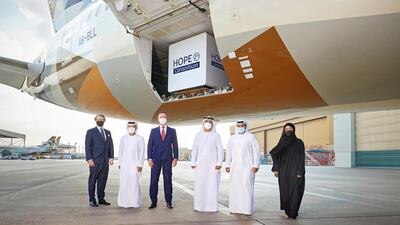The UAE is preparing to take part in a mass effort to roll out a global vaccine programme against Covid-19.
The country's location, with one-third of the world’s population reachable within a four-hour flight, makes it an ideal centre for distribution to all corners of the Earth.
Last week, Abu Dhabi announced it opened the Hope Consortium, a storage and delivery hub, to co-ordinate the massive logistical operation involved in shipping the various vaccines under development across the globe.
And Emirates airline previously said it would partner with global pharmaceutical producer, Pfizer, to distribute its highly-effective jab.
So how is the UAE planning to distribute vaccines once they are approved for mass use? The National explains.
What is Abu Dhabi's role in the distribution of Covid-19 vaccines?
Last week, Abu Dhabi launched a global logistics centre to deliver billions of Covid-19 vaccine doses around the world by the end of next year.
The Hope Consortium will provide vaccine storage and distribution and is being run by a group of government bodies and private companies.
Among these is Abu Dhabi Ports, which will provide “enhanced logistics capabilities” for the storage and distribution of more than 70 million vaccines.

The authority has designated a 19,000 square metre temperature-controlled warehouse facility in Khalifa Industrial Zone Abu Dhabi, which already houses more than 1 million vials of the vaccine.
Most of the vaccines under development require very cold storage, of up to -70°C, which poses a particularly difficult logistical challenge.
The facility in Kizad can accommodate pharmaceutical products at a range of 2 to 8°C as well as the more extreme range of up to -80°C, with the capacity to monitor temperature and humidity closely.
Capt Mohamed Al Shamisi, group chief executive of Abu Dhabi Ports, said the company was well positioned to support immunisation programmes.
“Abu Dhabi continues to play a vital role within the global effort to discover a vaccine for Covid-19,” added Dr Jamal Al Kaabi, undersecretary of Department of Health Abu Dhabi, which is also involved.
“And as part of those efforts, we are providing logistical capabilities that will position the UAE as a distinguished local, regional, and global distribution hub.”
What is the Hope Consortium?
A UAE-based public-private partnership that will help co-ordinate the roll-out of the global vaccination programme against Covid-19.
It is run by the Department of Health Abu Dhabi, Etihad Cargo, Abu Dhabi Ports Company, Rafed, part of ADQ, and SkyCell.
It has already transported five million doses this month and hopes to be able to move and store more than six billion vials, rising to more than three times that by the end of next year.
Distribution of the vaccines, which are all stored in the special facility in Abu Dhabi Ports, is carried out by Etihad Cargo, the first Middle Eastern carrier to gain the International Air Transport Association's centre of excellence for independent validators certification for pharmaceutical logistics. The UAE’s national carrier will use its network to supply vaccines.
SkyCell, a Swiss company that develops temperature-controlled logistics containers for the pharmaceutical industry, will establish a regional service and manufacturing centre in Abu Dhabi to aid distribution. The containers maintain steady temperatures for an average of 202 hours (8.4 days) and self-recharge automatically in a cooling chamber or refrigerated lorry.
The Hope Consortium has the largest capacity for vaccine storage and capability regionally and is also one of the largest hubs globally.
Does Dubai also have its own vaccination hub?
Yes. Emirates airline established its own dedicated airside hub for Covid-19 vaccines which opened last month.
Located at the airline's SkyCargo facility in Dubai South, the hub will allow the carrier to fly in vaccines from manufacturing sites globally.
Sheikh Ahmed bin Saeed, chairman of Emirates, said Dubai is “well positioned” to serve as a gateway and distribution hub for Covid-19 vaccines to the rest of the world.
“We have the infrastructure and logistics connections, and a geographic location that puts markets representing more than two-thirds of the world’s population within an eight-hour flying radius,” he said.
Emirates has also partnered with the global pharmaceutical producer Pfizer to help navigate the challenges of distributing its Covid-19 vaccine, which requires ultra-cold storage.
The vaccine has been found to be more than 90 per cent effective in trials, which are ongoing.
But it needs to be kept at a temperature between -70°C and -80°C.
Emirates president Tim Clark said the airline is working with Pfizer to develop methods to transport the vaccine.
Should it be approved for widespread use, as many as 50 million doses could be available this year, with capacity for 1.3 billion more to be manufactured in 2021, according to Pfizer and BioNTech, its German pharmaceutical company trial partner.
How many vaccines are in development?
More than 150 across the world. Several are now approaching final approval, which scientists say would have been unthinkable before the onset of the pandemic.
It typically took 10 to 15 years to develop a vaccine and bring it to market. And the fastest ever developed, for mumps, took four years in the 1960s.
The World Health Organisation is co-ordinating global efforts to develop a vaccine, with an aim to deliver two billion doses before the end of next year.
______________












